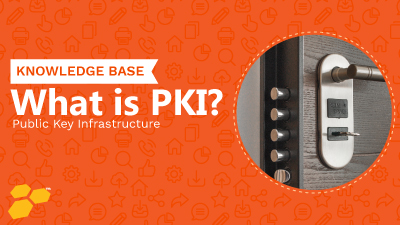 PKI (Public Key Infrastructure) ensures secure exchange of data and authentication over the Internet through management, distribution and identification of public encryption keys.
PKI (Public Key Infrastructure) ensures secure exchange of data and authentication over the Internet through management, distribution and identification of public encryption keys.
It can include a combination of components to manage the process of creating, distributing and revoking keys and digital certificates.
Benefits of PKI
- Military-grade security: PKI provides the highest protection of your sensitive documents and authentication of your users.
- Additional security functionalities: You can encrypt data, disk, and email, as well as digitally sign.
- Optimized authentication and cost savings: Password management is costly. PKI eliminates the need for users to remember long, complex passwords that they will need to change frequently. A single credential will give users access to multiple applications.
- Improved business processes: Eliminating password protocols will reduce helpdesk calls and an overall IT overhead.
Who’s using PKI?
The majority of implementations are in these industries:
- Financial Services
- Healthcare and Pharma
- Services
- Technology and Software
The most significant growth areas are:
- Public sector
- Retail
- Software organizations
A surge in adoption is contributed to:
- Increased use of cloud-based services
- Internet of Things (IoT)
 What are the main components?
What are the main components?
- Digital certificates
- Public and private keys
- Secure sockets layer (SSL)
- Certificate Authority (CA)
- Key security (HSM)
- Management tools


